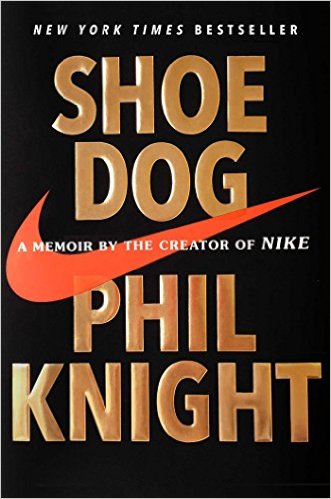 Phil Knight seemingly had a lot of slick editors to help him write his wonderful book (4/5 stars) on the creation and rise of Nike. But his passion, character, and insightful war stories all ring true. These were my favorite excerpts:
Phil Knight seemingly had a lot of slick editors to help him write his wonderful book (4/5 stars) on the creation and rise of Nike. But his passion, character, and insightful war stories all ring true. These were my favorite excerpts:
- What if there were a way, without being an athlete, to feel what athletes feel? To play all the time, instead of working? Or else to enjoy work so much that it becomes essentially the same thing.
- Every runner knows this. You run and run, mile after mile, and you never quite know why. You tell yourself that you’re running toward some goal, chasing some rush, but really you run because the alternative, stopping, scares you to death.
- The Japanese believe climbing Fuji is a mystical experience, a ritual act of celebration, and I was overcome with a desire to climb it, right then. I wanted to ascend into the clouds. I decided to wait, however. I would return when I had something to celebrate.
- After shaving, I put on my green Brooks Brothers suit and gave myself a pep talk. You are capable. You are confident. You can do this. You can DO this. Then I went to the wrong place.
Continue reading…

I’m an enthusiastic Amazon, Apple, Uber, and Google user because they make my life easier. I don’t think twice before upping my Prime membership. In fact, I like these companies so much, I’ve even willing to pay a little extra for the convenience they offer.
But obsessive brand loyalty will ultimately hurt us, argue two ivy-league economists for USA Today. “Each of us can do our part to make sure Amazon and others never get to the point of ubiquitous domination. It might introduce a bit of hassle and inconvenience into your life, but only a tiny bit. But by taking on this challenge, you’ll be doing the job that antitrust authorities, in an ideal world, might take care of on our behalf – ensuring that consumers and workers, rather than the owners of capital and algorithms – get a piece of the surplus that’s created by new business ideas.”
Make no mistake, I’m a proud American capitalist. But I like it even more when companies compete for my business. “Think about those credit card teasers we all get,” the authors add. “As long as we keep businesses thinking they need to chase after us to try to lock us in, they’ll keep on handing us value rather than using it to pad their bottom line.”
If you agree, consider shopping with competing companies and platforms from time to time to keep your favorite companies on their toes, hungry for your business, and willing to let you keep a greater share of the value.
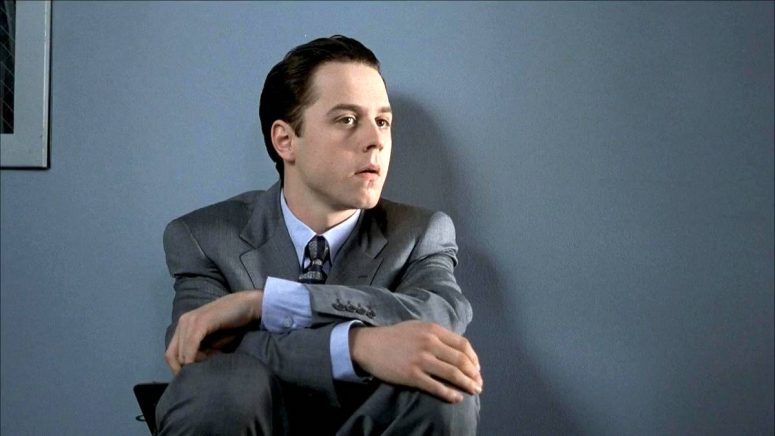
Courtesy New Line Cinema
“Hi, human. I sell this thing (in my case writing) for a living because I believe in it. It’s benefited myself and others you may know. Are you the right person to pitch? If no, do you know someone who is? If yes, is now a good time?”
I’ve been writing full time for 10 years now. Much of that time, if not half of the time, is spent asking people if I can write for them. In that sense, I’m either a writer who knows how to sell, or a seller who knows how to write.
Either way, I’ve followed the above pitch for the last decade. I don’t know if it’s the best sales approach, but it’s worked alright for me, and it’s one I feel is the most respectful.
Know a better way?
 Does .99 cent pricing really work? Wouldn’t it be easier to round everything to the nearest dollar?
Does .99 cent pricing really work? Wouldn’t it be easier to round everything to the nearest dollar?
The answer to both those questions is a resounding “yes.” Although it would be easier to round up, stores use so-called psychological pricing because it demonstrably boosts sales by 8%, according to one study of 60,000 mail-order catalogs.
In short, the 30,000 customers that received rounded up pricing spent 8% less than the 30,000 catalog recipients of 99 cent pricing. (Note: The two catalogs were identical except for pricing.)
Granted, this study was performed 20 years ago. But with those kind of gains, the trend is sure to stick around for a long time.
Content marketing has been around for centuries—ever since the first newspaper figured out they could sell ad space against stories that interested people. But it wasn’t until the last few years—even after mostly failed corporate blogging efforts—that content marketing has become a staple of modern marketing budgets in the social media age.
Consequently, commercial brands, communication departments, and Fortune 500 marketing arms are hiring former journalists, editors, and content strategists at an astonishing rate. One well-known software maker I consult for even has a bona fide news department. The place bustles like the New York Times newsroom. Their editorial content is generating executive interest and finding traction with online audiences.
That said, we’re still in the wild west of content marketing. Here are 10 ways to lay claim on the new frontier. Continue reading…

Lucasfilm
Take these. If you’re interested in journalism, the art of war, Star Wars, business, and/or are “white,” I think you’ll enjoy them:
- Access denied. In light of waning press access because celebrities, politicians, newsmakers, and producers now take their scoops and audiences directly to social media (instead of publications), we must “build a new independent media on a bedrock of explaining and celebration and condemnation,” writes John Herrman. Explainers, for instance, “assert authority without invoking expertise; they mimic the language of their audience; they offer closure and satisfaction in an endless stream.”
- Why it’s hard to win the war on terrorism. “War is so much easier when both sides are wearing uniforms,” writes Richard White.
- The first-world problem of being white. “What my son was expressing — that he wants the comfort of what he has but that he is uncomfortable with how he came to have it — is one conundrum of whiteness,” writes Eula Biss.
- Sneaky ways businesses trick consumers. Why that restaurant you used to love is no longer good among other things by Daniele Kline (i.e. cheaper ingredients slowly make their way into popular products).
- Star Wars strikes back. By Brian Hiatt. “The phrase that I used in front of, like, 5,000 Star Wars fans pumped to the gills, ready to see the trailer, was ‘It’s only a movie,'” Hamil says. “I was trying to appeal to the rational, sane people who know movies don’t really change your life, and if you really think we can make you feel like you’re 10 years old at 38, you know what’s gonna happen. So just don’t think that and you’ll be fine!”

Credit: Business Week
I recently read Paul Ford’s special report on software—all 36,000 words and three hours of it. If you work in computers, you should read it. If you work in business, you should read it. If you’re an adult human, you will learn a lot about the way things are and where they’re headed by reading it.
Admittedly, the story could have benefitted from some additional editing. Ford, after all, veers a little off topic. But like Bill Bryson, Ford is a master at explaining why things matter—in this case, why coders matter, and how they will increasingly influence the future.
If that’s doesn’t convince you to read the article’s entirety, maybe my 10 favorite excerpts will: Continue reading…
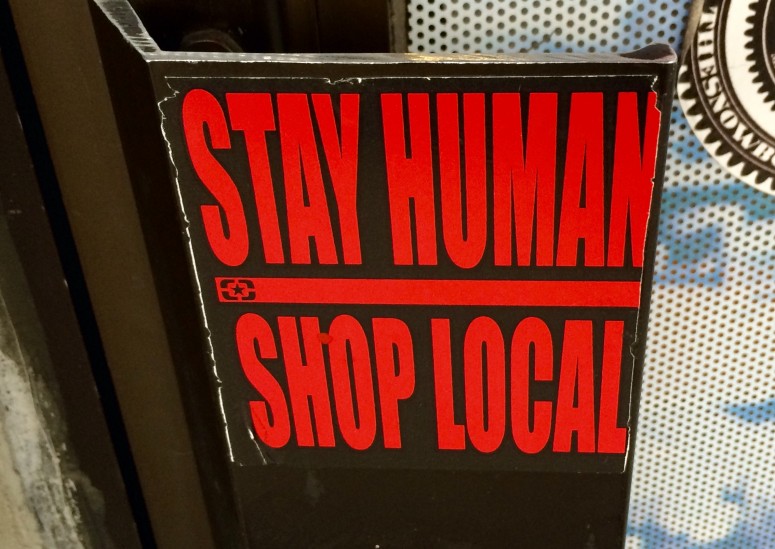
Taken at one of my local skate shops (Photo: Blake Snow)
Outside of groceries, my household shops online 90% of the time. That’s not me overstating something. That’s my wife’s estimate. She does the budget.
Over the last 10 years, Amazon Prime, Zappos, Target.com, iTunes, Netflix, and many other e-tailers have dramatically improved my family’s standard of living, product selection, and buying power, while reducing buyer’s remorse, time spent, and money spent consuming wants and needs.
Every now and again, I get romantic and decide to “shop local,” as they say. Usually I regret it. The last time I needed a pair of slacks, I went to a big box store. The style selection wasn’t what I wanted. 30 minutes of my life, gone.
Before leaving the parking lot, I launched the Amazon app, found a better pair of 4.5/5 star fitted-pants for less, and clicked “buy now.” The transaction took two minutes. The slacks would be on my door step two days later, and if, for whatever reason, I didn’t like them, I could put them back on my door mat, and a brown truck would magically return them for free.
We live a charmed life. Continue reading…
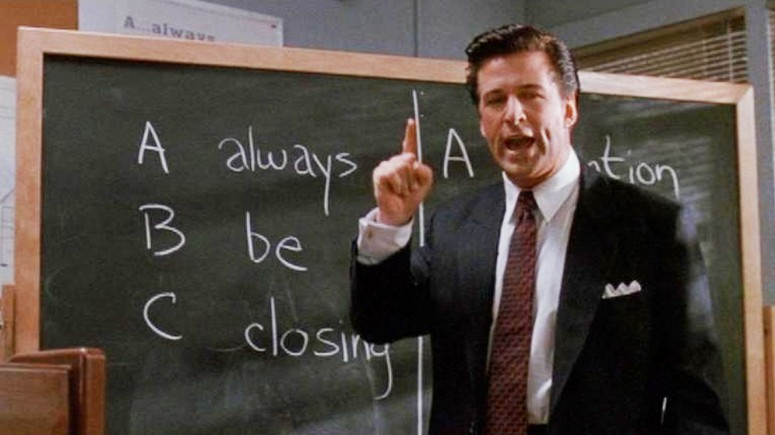
New Line Cinema
Selling is a challenge. It requires unwavering confidence, polite persistence, and a deep understanding of buyer demand. It also requires an ability to withstand constant rejection, unfortunate timing, and even bad luck.
Whether you sell to businesses or consumers, overcoming buyer objections in another challenge. Some may be unique to your trade, but most are quite common, regardless of industry. What are they and how can they be surmounted?
To find out, I ransacked dozens of reports, expert analyses, and top Google results. After the dust had settled, I encountered close to 100 specific objections. But most (if not all) of those are merely variations of seven fundamental objections, which I’ve distilled and categorized below.
Before getting down to the nitty gritty, a word of caution: sellers must first understand theirs and their prospects’ available “walk-away” options before addressing any concerns. If you don’t respect those, you’ll fail to appreciate the nuances of your market and have a harder time overcoming legitimate buyer objections.
Furthermore, “objections are a gift,” says Kyle Porter, CEO of SalesLoft. “It’s the customer telling you something that will help you sell to them.” In that sense, buyer concerns are rarely outright rejections—they’re merely requests for more information. Hence, good communication is key to overcoming them.
With that out of the way, here are the seven most common buyer objections and advice for overcoming them: Continue reading…

wired.com
A year after the Great Recession reared its ugly head, my biggest account of nearly three years terminated our contract. At the time, I was the head of news, principal feature writer and editor-at-large for IDG’s second-largest media property.
During my tenure, I managed a small team of remote reporters, oversaw the production of thousands of stories and grew web traffic by 15% in a saturated market. But it wasn’t enough to save my job. When the going got tough (i.e. when the print business failed to transition to digital in time), I was an easy person to let go, despite my page view gains.
One reason: I only visited headquarters twice during my term. I knew management liked me, but they didn’t know me well enough to realize that I, too, had mouths to feed; that I was a peer, their equal. To them I was an impersonal guy that did good work from afar — an easy name to let go that didn’t evoke much emotion.
“Sorry, Blake. We’re cutting back.” That was it. Continue reading…

Chick-Fil-A
I want all my children to work fast food someday. Why would I subject the little darlings to low pay, hectic dinner rushes, rude customers, demeaning work, ignorant coworkers, monotonous tasks, slippery shoes, and stinky clothes?
The short answer: Life is filled with the above, so you might as well expose ’em while they’re young. The long answer: Much of what I learned in business I learned from fast food. Not the creative stuff. Not sustained rejection. Certainly not cerebral problem solving.
But working fast food taught me the essence of hard work—livelihood’s version of basic training. After two years as a low-level cooking, toilet cleaning, truck unloading, chicken suit wearing, stench absorbing, fry serving, drive-thru calling, and overly perspiring wage-worker at Chick-Fil-A, here’s what I learned about business, customer service, teamwork, and life: Continue reading…

Snow Family
My wife and I recently borrowed a large sum of money to buy a highly illiquid asset. To secure the loan, we disclosed more of our financial behavior to the bank than we’ve admitted to anyone else, including God. And rightfully so—again we were borrowing a large sum of money, and they wanted to make sure we’d pay it back.
In addition to scouring our personal finances, the lender took a fine tooth comb to our business finances. I’m self-employed. But my wife owns 50% of “the company.” I generate and service all the income. She gets half. Many would call her—as my lender often did—a “silent partner.” But she is anything but. Continue reading…

Warner Bros. / Blake Snow
My stomach turns anytime I witness waste, lavishness, or squandering. I smile whenever I see thrift, frugality, or resourcefulness. (See also: The difference between cheap and frugal)
In fact, the latter is a life-long pursuit of mine: To be resourceful in everything I do, including my personal and business endeavorers.
Which is why I relate to Amazon’s leadership principle on frugality, explained like this Continue reading…



For me, 2013 is a year of tens. Ten years of marriage. Ten years of taking care of business. Continue reading…

Dungeons & Dragons

In an effort to reduce the spam I email to friends and family, take this:
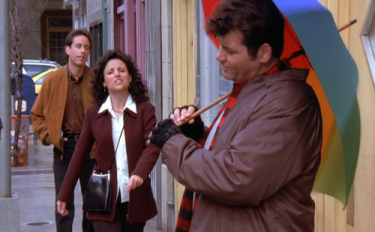
Seinfeld
In a market economy, I believe state run economic development can sometimes be a good thing. But I suspect it’s usually a bad thing. Here’s why, in which a Rhode Island state treasurer cautioned against backing a celebrity owned company that would ultimately become a $75 million bath for taxpayers:
“In general, I would proceed very carefully on this. [The company] is in the Boston area where there are 200 venture capital firms, and it is in a very hot area of gaming so if it were in fact a compelling investment I would have to think it would be well funded already by venture capitalist; the fact that many have looked at it and passed is a red flag.” Continue reading…
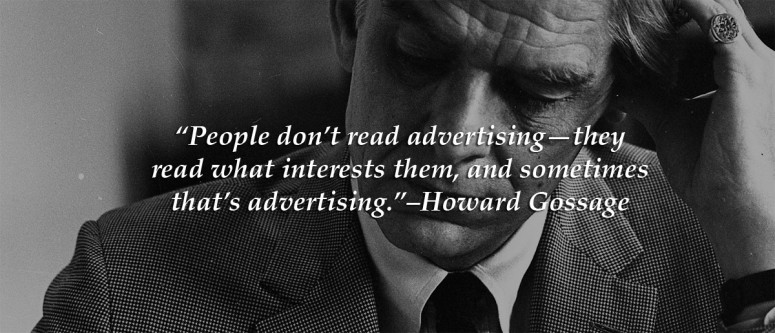
Words to sell by.
[youtube]http://www.youtube.com/watch?v=LsXRj89cWa0[/youtube]
I’ve grown up with Nike. I’ve watched them stir emotion with their commercials for decades.
The above ad — broadcast during the summer Olympics — is the latest in a long line of powerful advertising. It transcends mere sales and results in the thought of: “I like the company that made this commercial.” Of course, that ultimately leads to increased sales.
Brilliant.
Doubly so coming from the global goliath of sports apparel that has acutely managed to stay cool for all these years, largely due to great copywriting.
 You know those handheld beeping laser probes that some dentists use? They are a scam. At least that’s been my experience with them. And I’ve had 10 fillings!
You know those handheld beeping laser probes that some dentists use? They are a scam. At least that’s been my experience with them. And I’ve had 10 fillings!
Here’s how they work: Four years ago, after acquiring his first “diagnodent,” my old-old dentist said my x-ray and visual tests came back negative, but this newfangled beeping pencil-like thing said I had a cavity. Confused, I asked him: “Is this the same as an x-ray verified cavity.” No, he replied, but it did mean decay was starting. I asked if we could watch it with regular check ups. He agreed. Then retired later that year before I could follow up.
So I went to a new dentist. He too used a diagnodent. And each and every year, he would find more and more cavities with the device, while the xrays and visual tests all came back negative. Still doubtful, I pressed him on the issue each and every time. He always dodged my questions and politly replied, “If I were you I would get them filled.” He did this for not one, not two, but three consecutive years with an increasing amount of beeping teeth.
(As an aside, this dentist also said my root canal tooth should be replaced, as it could “crack and break at any time and injure my mouth.” Yep, I have a weaponized tooth, people. Keep your distance. It may attack at any moment.) Continue reading…
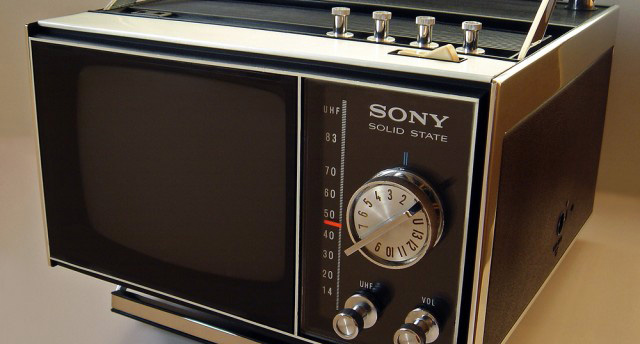
The New York times ran an insightful piece this weekend on the decline of Sony, which is valued at just a quarter of where it was a decade ago, and just one thirtieth the size of Apple:
“Sony makes too many models, and for none of them can they say, ‘This contains our best, most cutting-edge technology,’ ” Mr. Sakito said. “Apple, on the other hand, makes one amazing phone in just two colors and says, ‘This is the best.’ ”
In addition to department infighting, that really sums up Sony’s troubles: too much product, none of them hits. Continue reading…
I just got done reading this great story on a no-name musician landing a big break after “cold calling” a headliner on Twitter. In my opinion, the deal went through because of the following:
- The solicitor has talent. Continue reading…
As an independent contractor, I get asked a lot on how I make a living. The easiest answer is “I work from home.” If that doesn’t satisfy the interviewer, however, I’ll usually say “I’m a writer,” which is only partly true.
In many ways, I’m a jack of all trades. Writing and developing content for others is my forte. But I also enjoy critiquing software and games, moonlighting in online advertising, content marketing, and one-off projects that present a unique but hard-to-screw up challenge.
That said, I never over promise. I’m quick to tell a potential client or existing client “I don’t do that” when asked about other disciplines and send them on their way—mostly because I do crappy work when I’m not passionate about it. That and I refuse to engage in work I don’t like doing, regardless of how well it pays.
(Seriously, doing stuff you don’t enjoy solely for money or status is the epitome of living a lie. I realize some people have no choice in the short-term and often have to take one for the team to make ends me. But EVERYONE has a choice in the long term. It just takes planning, sacrifice, and guts.)
Anways, long story short, here’s how I became a thousandaire last year: Continue reading…
“There are two types of companies: those that work hard to charge customers more, and those that work hard to charge customers less. Both approaches can work. We are firmly in the second camp.”—Jeff Bezos, founder and CEO of the Seattle-based Amazon.com, now going on seven consecutive years as my favorite website.
Great video, particularly from 2-5 minutes.
 Today, auctions represent only 31% of all Ebay sales. A decade ago, Ebay was suppose to change the way everything was bought and sold. That didn’t happen. A new article in Wired tells why:
Today, auctions represent only 31% of all Ebay sales. A decade ago, Ebay was suppose to change the way everything was bought and sold. That didn’t happen. A new article in Wired tells why:
To begin with, the experience of auctions changed over time, generally in ways that made them less appealing to both buyers and sellers. Scot Wingo, CEO of ChannelAdvisor, which consults for ecommerce companies, points to the advent of sniping—the practice of placing winning bids at the last second—as something that has alienated ordinary shoppers…
Bargains, too, have become less common, as the market matured and people on both sides of the transaction became savvier…
Really, though, the biggest factor in the decline of the auction may simply be that the novelty of bidding wore off. “The Internet stopped being a source of wonder and became a place to do certain kinds of business,” Koehn says. “Once that happens, you start to think about things like ‘Does it make sense to spend this much time on an auction when I might not even get the item in the end?’” In econospeak, the hedonic benefits of bidding on eBay diminished.
In my opinion, I think the information age has simply normalized pricing. By that I mean you can save a buck or two on ebay, but you really have to work for it… and wait for it. Why not “buy it now” for a few bucks more elsewhere?
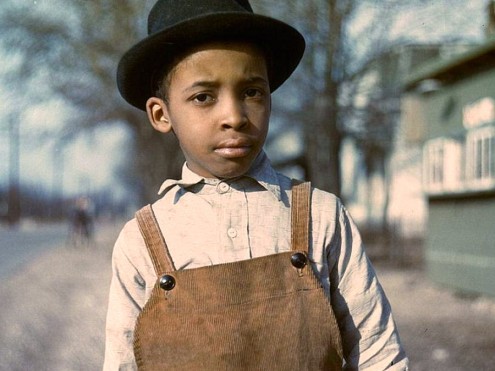 More rare color photos of the depression here
More rare color photos of the depression here
[youtube]http://www.youtube.com/watch?v=JJFqRcvq3rw[/youtube]
Samsung sponsored this guy Kenton Cool (awesome name) to summit Mount Everest for a ninth time this month. In exchange, the company had him place the first cell phone call ever from the highest point on Earth, to his wife. What a moment.
J Dawgs is delish! (check the user reviews)
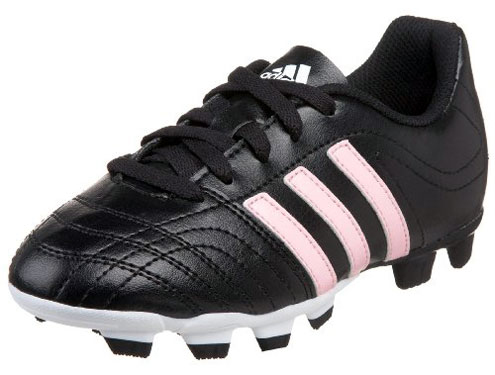
See those three stripes? They’re called “diva,” not pink, according to Adidas. And the white you see is “running white,” as opposed to idle white. I know because that’s what the box on my kitchen counter says. (They’re not for me, mind you, but the little soccer player I father.)
Adidas isn’t the first shoe manufacturer to use confusing names. I’ve seen red called “fire” on Nikes and blue called “ice” on Reeboks.
The silliness makes me wonder: Could shoe manufacturers sell more shoes by using color names people understand? Granted, people don’t shop by shoe boxes; they shop by display. But I imagine some prospective buyers have crossed an unsuspecting color and decided to pass on it. I know for a fact that ambiguity always hurts your chances.
That said, is there any proof that unconventional (or idiotic) color naming boosts sales? I doubt it.
Either way, at least Adidas got the hueless color right when describing the above shoes. They call it “black.”

They have cash—lots of it.
I’m a big fan of cash. Love the cash.
Insightful article by Wired on bucking offshoring manufacturing in favor of higher yield American manufacturing:
Today, a year since Krywko’s decision to go against the offshoring tide, Sleek Audio has a full-scale manufacturing operation that can be reached via a 15-minute car ride rather than a 24-hour flight. Each earphone costs roughly 50 percent more to produce in Florida than in China. But Krywko is more than happy to pay the premium to know that botched orders and shipping delays won’t ruin his company. And so far, the gambit appears to be paying off: Based on enthusiastic customer response, Sleek Audio is now projecting 2011 to be its most profitable year ever.
Globalization has been great. But thanks to latency, localization is thriving once more. It’s like the best of both worlds now.
 This is wrong.
This is wrong.
[youtube]http://www.youtube.com/watch?v=H4k9oEEXfyI&feature=player_embedded#at=148[/youtube]
I love entrepreneurial ingenuity.
 As the value of higher education continues to decline, these are some great alternatives: Start a business, travel the world, create art, make people laugh, write a book, work for a charity, master a game, master a sport. Splendid!
As the value of higher education continues to decline, these are some great alternatives: Start a business, travel the world, create art, make people laugh, write a book, work for a charity, master a game, master a sport. Splendid!
As seen on Yahoo News: “The most obvious way out of this mess is for bankers and developers to build or convert existing units into affordable studio apartments for the masses… Those kind of units created an on ramp to home ownership in the late 50s and early 60s. Instead, residential insiders are waiting for the country to be forced into some big public jobs initiative in hopes that property values can be propped up to levels that won’t massively threaten equity. They’re waiting for somebody to save them from the market instead of responding to it. Somebody’s got to take initiative. Will it be industry or government?”
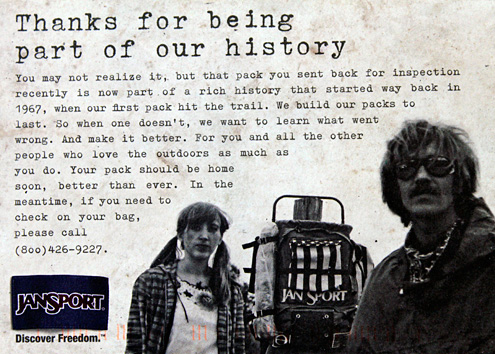
Jansport sent my wife the above post card, after she returned her nine-year old pack for free warranty repair. Thanks, Jansport! Although I recently purchased a competing brand on a whim, my family will never buy another brand of backpack after this nice gesture. Rock on!

An Amazon.com warehouse. Storefront of course being their awesome website. Via The Big Picture.

I needed an extra HDMI cable for my living room. So I turned to where I always go for such things: Amazon.com.
When I found one for $2.15 with free shipping, I was skeptical. But the 4.5 star average user rating quickly quieted any concerns. After all, the item has been favorably reviewed a whopping 3,231 times on Amazon.
So I bought it.
The fairly advanced cable arrived today, after only a few days. The craftsmanship is middle grade. It works fine. It suits my needs, if not exceeds them given the ridiculously low price. So how the crap can someone make money selling this thing for only $2.15 with free shipping?
It can’t just be volume. It can’t just be cheap foreign labor.
In other words, if this little guy isn’t proof that the Chinese artificially deflate their currency, despite their booming economy, I don’t know what is. Booming economies, after all, have trusted currency. Trusted currency results in higher trading prices (i.e. historically high prices for Dollar and Pounds when compared to the rest of the world).
What’s a reasonable consumer to do when the global economy doesn’t play by the rules?
In China’s defense, the U.S. just printed 6 billion notes, which isn’t exactly playing by the rules. But at least our currency is rightfully trading at market prices. The Chinese’s, on the other hand, is still bottom of the barrel, even though its economy is similar in size and trusted almost as much as the American economy.
Something’s fishy, no?
 I went to lunch today with an old business school buddy. We always have a good time making fun of brainless ideas while trying to make a honest buck. Today, we ridiculed some of the following business cliches, which are beyond stale and should never be used; otherwise you’ll sound like everyone else and influence few:
I went to lunch today with an old business school buddy. We always have a good time making fun of brainless ideas while trying to make a honest buck. Today, we ridiculed some of the following business cliches, which are beyond stale and should never be used; otherwise you’ll sound like everyone else and influence few:
Continue reading…
 Every website should be updated regularly. Search engines like it. Readers like it. Your bottom line will like it.
Every website should be updated regularly. Search engines like it. Readers like it. Your bottom line will like it.
But if you operate a working, established, or otherwise popular website (say at least 2,000 visitors per day), I would never recommend a major visual or mechanical overhaul. It pisses people off. And when that happens, loyal visitors flock to alternatives in mass exodus, as Digg users have done this month.
There are a couple of exceptions to this rule. If your website has a monopoly on information, you can do whatever you want, and readers will keep coming back. And if your website isn’t “working, established, or popular” to begin with, you only stand to gain from a major overhaul, provided it’s done by someone who knows what they’re doing (aka no flash, proper xhtml/css coding, a regular content plan, and most importantly, good usability).
What can you do then to improve or refresh established websites? My advice is to make subtle changes to your design and monitor your visitor’s behavior. If the change has no significant effect, or better, a measurable improvement, keep the change. If the change is off-puting to visitors, revert to the the previous version immediately and re-evaluate both your desire for change and your strategy.
I know this holds true on the few “popular” websites I publish. And if Digg is any indication, I know it holds true for mega websites as well.
May all your redesigns be well-received.
The competition has thinned.
 Via SmartBlog:
Via SmartBlog:
-
Nonverbal tells. Liars don’t rehearse their gestures, just their words. The cognitive load is already huge, so when they tell their story, they freeze their upper body, look down, lower their voice, and slow their breathing and blink rate. And they will exhibit a recognizable moment of relief when the interview is over. Interrogators will often end an interview prematurely just to look for that shift in posture and relaxation.
-
Verbal tells. People who are overly determined in their denial resort to non-contracted rather than relaxed language. “Did not” rather than “didn’t” They will use distancing language as in “ that woman” rather than someone’s name. They will often pepper their story with inappropriate detail as if to prove to you they are telling the truth. They will look you in the eye too much, as if to appear honest, when in fact most people telling the truth only look you in the eye a comfortable 60 % of the time.
-
Stories told in perfect chronological order. Try to get them to tell their story backwards. They can’t do it. Honest people remember stories in the order of emotional prominence. Liars tend to concoct a time-stamped story but they falter when asked to recount it differently.
The short answer: Since they’re coffers are already full, they’re complacent. And complacency is the enemy of inspiration.
In my case, once my “business reserve” (aka checking account) is at a comfortable level, I know I get complacent.
So to stay inspired, I guess I need to be more ambitious with how much money I’m chasing—rather than wait for when the heat is on.
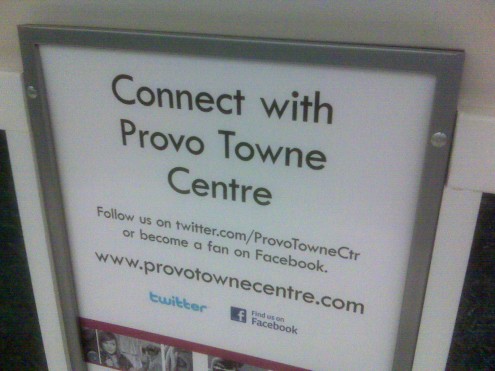
Because everyone wants to follow and friend a shopping mall. Way to think big, guys.
Used video games have been around since the early ’80s. But they weren’t a problem in the eyes of developers until the middle of the decade, at which point game sales weren’t growing as fast as they used to.
Rather than blame the safe creative bets, bloated budgets, and $10 HD surcharge (yes, many games carry an MSRP of $60 these days) for the decline, developers set their sites on used game sales. “When the game’s bought used we get cheated,” echoed one senior official this week, the latest in a long line of whining.
In light of complaints, some game makers are including single use “unlock codes” in factory sealed games, which they have every right to do. Dumb, but legal.
Still, imagine if other tangible goods started stripping features at resale. For example, “Unless you buy this house new, we’ll section off a part of the home behind a cement wall.” Or, “To see the end of this DVD, you’ll need to enter your single use unlock code.” Or, “Power steering won’t work in this car unless purchased new.”
Is that what game-makers are really after? Is that serving the customer and engendering them to your brand? Do video games really expect immunity from the resale of packaged goods, even though that’s the right they transfer to consumers when selling merchandise? Because if so, that’s incredibly backwards. Unrealistic. Hypocritical. Ignorant.
Obviously the industry is still run by insecure nerds.
A friend recently (and politely) declined business from someone he once worked with. This someone didn’t take “no” for an answer. Nor did he take unanswered emails. Behold, his latest email:
Dude… what am I missing here ??
I have always assumed entrepreneurs treated each other with respect and responded to each other; especially those that have known each other for a while.
So… um… why are you treating me (a 3 tie INC 500 winner and 5 x successful entrepreneur; arguably more successful than you)… like crap ?
I respected you enough to personally respond… not to have one of my people call; you.
If that is your definition of class. Please… don’t respond to my email at all.
Persuasion: You’re doing it wrong. Ellipses too. Not to mention unnecessary spacing before question marks. In any case, my buddy did not reply. ZING!
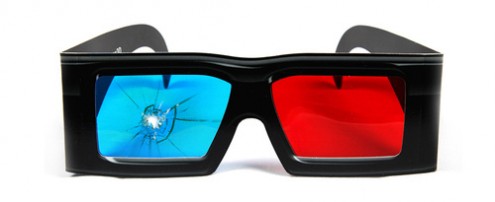
Don’t let the door hit you on the way out (for a second time).
 After Tiger Woods took “extramarital affairs” to new lows this year, numerous sponsors canceled their contracts with the once role model, including Gatorade, AT&T, General Motors, Accenture, Tag Heuer, and Gillette. Out of all his major sponsors, only two “stood by” his sleaziness, including Nike and Electronic Arts.
After Tiger Woods took “extramarital affairs” to new lows this year, numerous sponsors canceled their contracts with the once role model, including Gatorade, AT&T, General Motors, Accenture, Tag Heuer, and Gillette. Out of all his major sponsors, only two “stood by” his sleaziness, including Nike and Electronic Arts.
Today, the latter is wishing it hadn’t. Continue reading…

I’ll take one, please. (Photo by Tim Ormond, taken deep within the bowels of Salt Lake County.)
 Phil Knight seemingly had a lot of slick editors to help him write his wonderful book (4/5 stars) on the creation and rise of Nike. But his passion, character, and insightful war stories all ring true. These were my favorite excerpts:
Phil Knight seemingly had a lot of slick editors to help him write his wonderful book (4/5 stars) on the creation and rise of Nike. But his passion, character, and insightful war stories all ring true. These were my favorite excerpts:


 Does .99 cent pricing really work? Wouldn’t it be easier to round everything to the nearest dollar?
Does .99 cent pricing really work? Wouldn’t it be easier to round everything to the nearest dollar?















 You know those handheld
You know those handheld 
 Today, auctions represent only 31% of all Ebay sales. A decade ago, Ebay was suppose to change the way everything was bought and sold. That didn’t happen. A new article in Wired
Today, auctions represent only 31% of all Ebay sales. A decade ago, Ebay was suppose to change the way everything was bought and sold. That didn’t happen. A new article in Wired 



 As the value of higher education continues to decline,
As the value of higher education continues to decline, 


 I went to lunch today with an old business school buddy. We always have a good time making fun of brainless ideas while trying to make a honest buck. Today, we ridiculed some of the following business cliches, which are beyond stale and should never be used; otherwise you’ll sound like everyone else and influence few:
I went to lunch today with an old business school buddy. We always have a good time making fun of brainless ideas while trying to make a honest buck. Today, we ridiculed some of the following business cliches, which are beyond stale and should never be used; otherwise you’ll sound like everyone else and influence few:
 Via
Via 

 After Tiger Woods took “extramarital affairs” to new lows this year, numerous sponsors canceled their contracts with the once role model, including
After Tiger Woods took “extramarital affairs” to new lows this year, numerous sponsors canceled their contracts with the once role model, including 